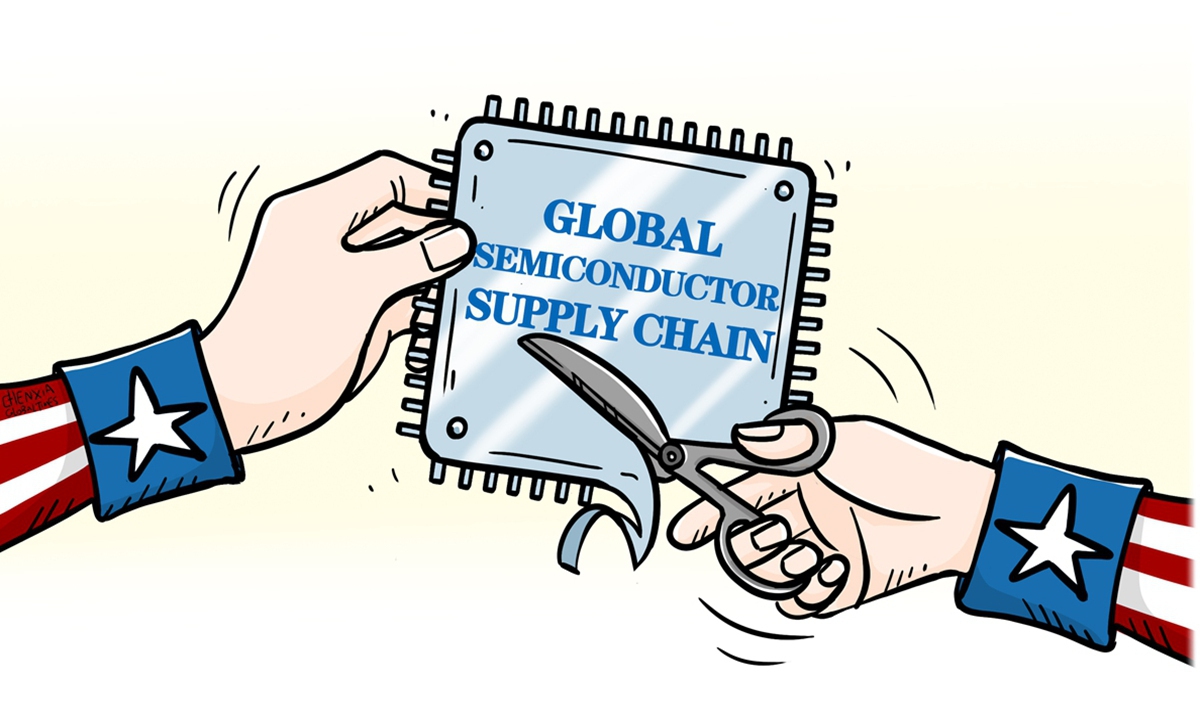
Illustration: Chen Xia/GT
The US doesn’t seem to be hesitant for a second to sacrifice its allies so as to contain China. The tightening chip export restrictions show that it is willing to do whatever it takes to hinder China’s technological development. But that doesn’t mean its allies will unconditionally follow such an extreme approach toward China, especially when their own interests will be at greater risk.
The fact that the subject of the new US export restrictions involving ASML is under heated debate in the Netherlands is the latest example of the conflict of interests. Several Dutch lawmakers on Tuesday challenged the Netherlands’ trade minister over whether the US has acted correctly in unilaterally imposing new rules regulating the export to China of a chipmaking machine made by ASML, Reuters reported on Wednesday.
Dutch media reports disclosed that Dutch political parties CDA, D66 and Volt called for the cabinet to advocate more strongly for chip machine manufacturer ASML when dealing with the US.
The US last week announced new rules giving Washington the right to restrict the export of ASML’s Twinscan NXT1930Di machine if it contains any US parts at all.
As a result, ASML needs to apply for a license from Washington to sell these machines, even though they could be exported without issues under Dutch rules.
After Huawei Mate 60, a smartphone made by Chinese tech giant Huawei using advanced chips, alarmed the US, Western media reports emerged that the mysterious chips were produced on ASML chipmaking machines that were not on the US export restriction list. So the new US rules are clearly aimed at further tightening restrictions on technology exports to China to stem the potential for Chinese technology companies to break through the semiconductor bottleneck.
But this has also once again put the Netherlands in an awkward position, as the Dutch government now needs to come up with a reasonable justification for its response to the legitimate demand to protect the interests of domestic businesses.
AMSL has been prohibited from selling its most sophisticated chipmaking machines to China since 2019. Under US pressure this year, the Netherlands has introduced stricter export controls on high-end chipmaking equipment.
China has become a major buyer of ASML equipment. In the third quarter, China’s purchase accounted for 46 percent of ASML’s sales, partly because Chinese companies rushed to place orders ahead of looming export controls. But from 2024, when the Dutch restrictions are set to take full effect, ASML will see decreased sales to China. Under such circumstances, further strengthening export restrictions on more equipment is expected to seriously harm the company’s interests.
Indeed, ASML’s release of lower-than-expected orders and warning of flat sales next year indicates the importance of the Chinese market.
Based in the Netherlands, ASML has become an important part of the Dutch economy and a symbol of the country’s technology prowess. So the Dutch government knows clearly what a sudden and sweeping cutoff of ASML’s supplies to China would mean for the country.
So it announced the export restriction but said it would be implemented next year, with the view of taking care of its own company in a flexible way.
But the Dutch approach is anticipated to face a severe test because the US apparently won’t allow any time or opportunity for Chinese companies to achieve a breakthrough, even at the expense of hurting its allies’ interests.
Now anger and concerns about the potential damage of the new US rules to the Dutch economy has triggered disputes and debate within the Netherlands. How to protect ASML’s legitimate interests under US pressure will be a test of the Netherlands’ economic independence.
As for China, it not only needs to speed up its own research and development, but also needs to strengthen communication and cooperation with third parties, such as the Netherlands, which are constrained by US policies.
By offering them with more favorable and open market access, as well as promoting economic and trade cooperation based on international norms, China, together with other partners, can jointly tackle the US coercion.










